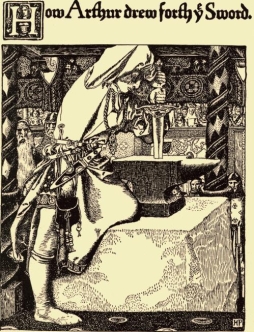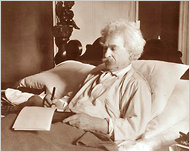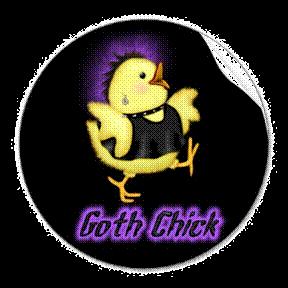 Mark Twain, the legendary American author and humorist, left behind perhaps the most famous unpublished autobiography in history. Claiming the opinions and stories within were too strong to be received by his public, Twain left instructions that the book was not to be published until 100 years after his death.
Mark Twain, the legendary American author and humorist, left behind perhaps the most famous unpublished autobiography in history. Claiming the opinions and stories within were too strong to be received by his public, Twain left instructions that the book was not to be published until 100 years after his death.
Samuel Clemens (“Mark Twain”) died on April 21, 1910. Accordingly, the University of California Press published Volume One of the Autobiography of Mark Twain this week, releasing the 760-page first installment of what will be a 3-book series on Monday, November 15.
Twain dictated his autobiography in 1906, four years before he died. The text of those dictations, with explanatory editorial notes, have been gathered into these volumes. While unpublished, the autobiography has not been secret — in fact, biographers have had access to it for the last century, so there are no bombshells waiting for us in its pages.
What there is is a stream-of-consciousness self-portrait created from anecdotes, stories, and portraits of America as it existed over a century ago, captured by one of this nation’s keenest writers and social critics. Written with little regard for chronological order, Twain tells of his encounters with the fabulously wealthy (but “grotesque”) Rockefeller family, his troubles with bankruptcy, the tragic death of his daughter Susy, who died at 24 of meningitis, and much more. Over at Ambrose & Elsewhere, our main man James Enge has done a full review, saying in part:
Standout sections of this book include Twain’s discussion of his brother Orion, who seems to have been bipolar, and Twain’s account of how he patiently and gently corrected an overzealous editor… there is a lot else here, including a sort of 19th century Paris Hilton – a woman who was famous simply for being famous. That story made me feel better about our crappy media culture – apparently it’s always been crappy, ever since the invention of mass media.
Twain, author of The Prince and the Pauper, A Connecticut Yankee in King Arthur’s Court, and The Mysterious Stranger, was one of America’s finest fantasists. The Autobiography of Mark Twain, Volume One, includes 66 photographs and is priced at $34.95. More information is at the Amazon.com listing.
 The Outlaws of Sherwood, by Robin McKinley
The Outlaws of Sherwood, by Robin McKinley I escaped with the family for the realm of Florida over the last week, and we did the usual tourist things. I managed to leave most of my deadline worries behind me, and while I took my writing notebook, I actually got very little work done. Instead, I recharged, spent time with my wife and kids, and didn’t obsessively think about plotting, dialogue, or character motivation.
I escaped with the family for the realm of Florida over the last week, and we did the usual tourist things. I managed to leave most of my deadline worries behind me, and while I took my writing notebook, I actually got very little work done. Instead, I recharged, spent time with my wife and kids, and didn’t obsessively think about plotting, dialogue, or character motivation. As I write this, I’m closing in on the 50,000 word mark of my
As I write this, I’m closing in on the 50,000 word mark of my 

 So in this Kindelized, iPadded and Nooked age of reading trivialized by celebrity tell-it-alls, self-help elevation and political numbwits (though excerpts from the book demonstrate that things were just as bad in Twain’s era as ours, except ours is perhaps a little worse thanks to the Internet and cable TV), Mark Twain’s physical opus is this season’s Christmas holiday hit, surpassing even that of Keith Richards.
So in this Kindelized, iPadded and Nooked age of reading trivialized by celebrity tell-it-alls, self-help elevation and political numbwits (though excerpts from the book demonstrate that things were just as bad in Twain’s era as ours, except ours is perhaps a little worse thanks to the Internet and cable TV), Mark Twain’s physical opus is this season’s Christmas holiday hit, surpassing even that of Keith Richards.


 Welcome to Goth Chick post number fifty-two.
Welcome to Goth Chick post number fifty-two.